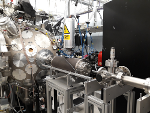| 18 | | Coming soon ... |
| | 18 | Particle beam therapy provides significant benefits over conventional X-ray radiotherapy. Protons and heavier ions lose most of their energy in the last few millimetres of their path (Bragg Peak), enabling tumours to be targeted with greater precision and reducing the collateral damage to surrounding healthy tissue. An important challenge in particle therapy is the uncertainty in the range of the beam. |
| | 19 | |
| | 20 | |
| | 21 | |
| | 22 | To ensure that treatment is delivered safely, a range of quality assurance (QA) procedures are carried out each day before treatment starts. |
| | 23 | |
| | 24 | A detector is currently under development at University College London |
| | 25 | to provide fast and accurate proton range verifications, and speed up the daily QA process. The new system utilises a multi-layer calorimeter to record the depth-dose distribution of a proton therapy treatment beam and make direct measurements of the Water Equivalent Path Length (WEPL) with high resolution at clinical rates. |
| | 26 | |
| | 27 | |
| | 28 | |
| | 29 | The range calorimeter is also used to test the achievable sensitivity of real-time theranostics for carbon treatment using a mixed He/C beam. |
| | 30 | |
| | 31 | Range uncertainties caused by intra-fractional motion during carbon ion treatment could be monitored online using a small contamination of helium ions in the beam. At the same energy per nucleon, helium ions have about three times the range of carbon ions, which could allow, for certain tumours, a simultaneous use of the carbon beam for treatment and the helium beam for imaging. |
| | 32 | |
| | 33 | In this talk, the design and performance of the Quality Assurance Range Calorimeter (QuARC) are presented. |
